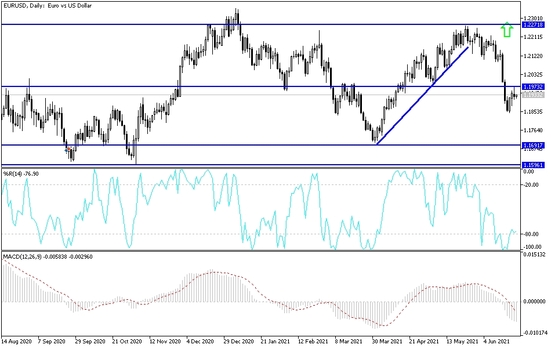The dollar is still the strongest with expectations of imminent tightening of the US Federal Reserve's policy, while the European Central Bank is in a cautious waiting mode. European countries are still concerned about the variables of the Coronavirus.
Germany's CDC says the delta variant accounted for more than 15% of the country's coronavirus cases by mid-June, with its share nearly doubling within a week. Accordingly, the Robert Koch Institute said in a weekly report that the share of the most contagious delta variant in serial samples rose to 15.1% in the week ending June 13. This compared to 7.9% in the previous week.
The alpha variant, which was first discovered in Britain, remained dominant in Germany, although its share decreased to 74.1% from 83.5%.
The total number of cases in Germany fell to its lowest level in months. On Wednesday, the CDC said 1,016 new cases were reported over the previous day — a rate of 7.2 new cases per 100,000 residents over seven days. Authorities have eased many restrictions but point to sudden increases in Britain, Portugal and Russia driven by the type of delta, first discovered in India, as evidence of the need to remain vigil.
The recent increase in novel coronavirus cases is advancing in the Lisbon region, with new infections driving the number of daily cases in Portugal to a four-month high. Only yesterday, Portugal reported nearly 1,500 new cases, two-thirds of which are in the metropolitan area where about 2.8 million people live. The national cumulative 14-day Covid-19 case reporting rate per 100,000 people rose to 130.
The pressure on hospitals remains under control, with only 437 patients admitted with the virus and 100 in intensive care. The Portuguese government has already banned travel to and from the Lisbon region on weekends. Experts blame the delta variant for the virus' spread there. New restrictions on Lisbon are widely expected to be announced after Thursday's cabinet meeting.
EUR/USD technical analysis: Today's data, the reaction of which will determine the future of the EUR/USD closing for this week. The general trend is still bullish, and the rebound attempts are still weak, and the bulls will not succeed in controlling the performance more without breaching the resistance levels 1.2040 and 1.2130, respectively. So far, stability below 1.2000 supports the bears' dominance and warns of a stronger bearish move. I still prefer buying the pair from every bearish level.
As for the economic calendar data today: The German IFO reading will be announced, then a batch of important US economic data will be announced, led by the announcement of the GDP growth rate, jobless claims and durable goods orders.

